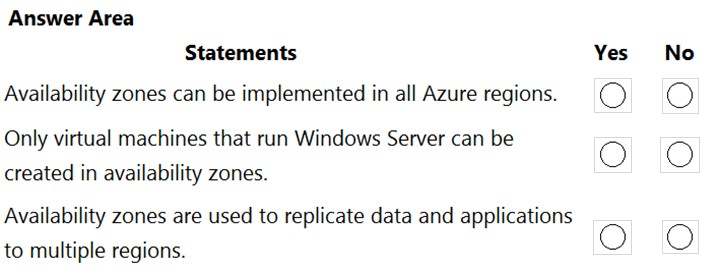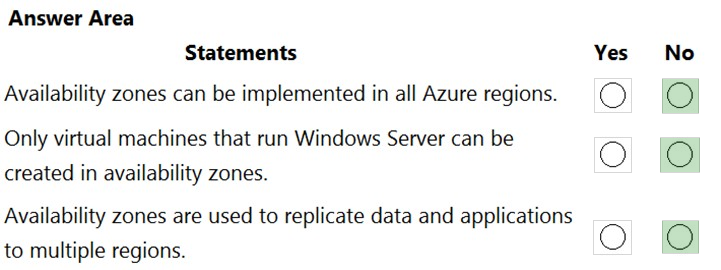HOTSPOT -
For each of the following statements, select Yes if the statement is true. Otherwise, select No.
NOTE: Each correct selection is worth one point.
Hot Area:

HOTSPOT -
For each of the following statements, select Yes if the statement is true. Otherwise, select No.
NOTE: Each correct selection is worth one point.
Hot Area:


Box 1: No -
Not all Azure regions support availability zones.
Box 2: No -
Availability zones can be used with many Azure services, not just VMs.
Box 3: No -
Availability Zones are unique physical locations within a single Azure region.
Reference:
https://docs.microsoft.com/en-us/azure/availability-zones/az-region#azure-regions-with-availability-zones
Correct Answer. No, No, No 1.)Not all Regions support Availability zones 3.)Availability zones are used to replicate data and applications in the same region(and not multiple regions)
You are right, answer as No, No, No. 3. Each region is separate and availability zones only work for a particular region. You can't use them to replicate data across regions.
No No Yes
They are saying how they are used not what they are. I believe the answer explains what they are but not their purpose (which is the point of the question). Availability zones are used to replicate your data in different physical locations and I can choose to locate my data in 2 different regions to ensure high availability
Question 3 is NO. To all people saying YES to question 3. Stop Please. Availability Zones are used WITHIN a region. So stop saying that it is used to replicate data accross multiple regions. See https://docs.microsoft.com/en-us/azure/storage/common/storage-redundancy LRS : WIthin a datacenter, within a azone ZRS : Within a zone, within a region GRS : To a secondary region ("region pair") GZRS : ZRS + GRS.
LRS: Locally redundant; within ONE data center in an Availability Zone. ZRS: Spans the 3 AZ within a Region (that's why it's called "Zone Redundant" GRS: Exists in ONE AZ (data center) of a REGION, and another AZ (data center) of a secondary REGION ("Geo-location" Redundant). GZRS: Spans the 3 AZ within a Region, and asynchronously replicated to another AZ in a secondary Region.
Not every region has multiple Availability Zone. Some regions may have only one Availability Zone. One can run both Linux and Windows virtual machines created in the availability zone. Availability zones are used to replicate data and applications in the same region
c is NO as we see in diagram on MS module too, AVZs within single region only replicate data within each other, else not.
in the exam on 29jun2023
This came up on 11-16-22. N N N. Not all regions support Availability Zones; Linux and other non-VM resources are allowed in AZ; Replicate within region.
I don't follow... "Availability Zones Can be inplemented in each Region". Can they? Yest they can. Are they implemented already? Who knows!? this is a different question....
Got this on 11/29/2022
Correct No,No,No
Technically if you puty yes for 3 you would be correct, another example of poorly written question
Region Pairs are used to replicate data and application to multiple regions not availability zones
exactly
this question in in exam 21/11/2022
No, No, No
This showed up today. Had 36 questions and scored an 857, and the questions here were all covered on the test! I did answer this one correctly.
NNN is correct answer: 1. No: Not all Azure regions currently support availability zones. Microsoft continues to expand availability zone support across more regions, but as of now, they are available only in select regions. 2. No. Availability zones support virtual machines running both Windows and Linux operating systems. They are not limited to just Windows Server. 3. No: Availability zones are used to replicate data and applications within the same Azure region to provide high availability and fault tolerance. Replicating data and applications to multiple regions is typically handled by other services such as Azure's paired regions or geo-redundant storage.
On Exam Jun/24
Not all Regions support availability zones , no no and no
The first statement is incorrect. All Azure regions have Availability zones, but not all regions support all services.